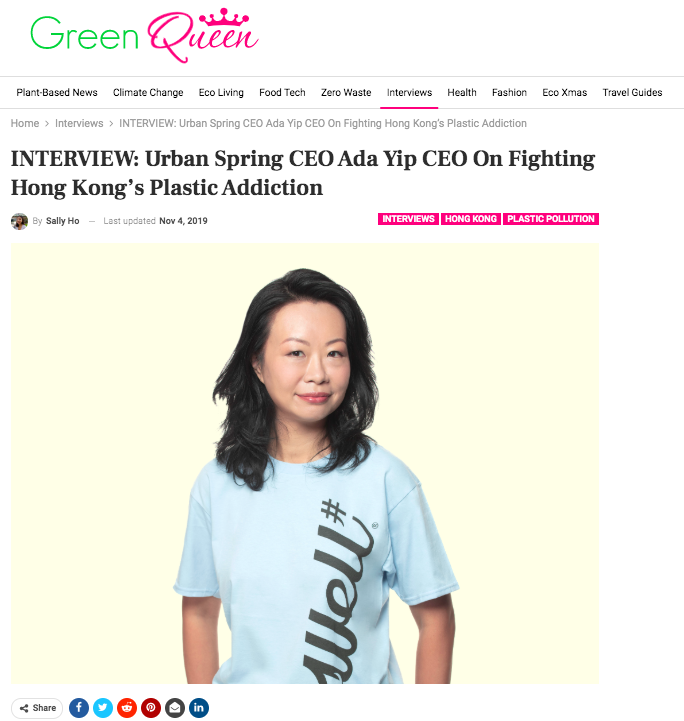We sat down with the CEO of Hong Kong-based startup Urban Spring, Ada Yip, who is on a mission to fight plastic pollution in the city. Hong Kongers buying more than 1.5 million disposable plastic bottles of water per day, an addiction Ada hopes to combat with her unique digital-forward aesthetically-pleasing refill #Wells across the city. Since 2017, the social enterprise has installed more than 200 water refill stations across Hong Kong, saving an estimated 2 million bottles so far. In the below interview, Green Queen talks to Ada about data-based sustainability solutions, a waste-less lifestyle, the challenges of pushing the plastic-free movement in Hong Kong, and her hopes for the future.
GQ: How did your journey with Urban Spring begin?
AY: I met one of the co-founders of Urban Spring around two weeks before their operations began and were still working with designers to figure out what the product would look like. It wasn’t my original idea, and we were talking and realised that our values really aligned. He then asked me to join to help lead and bring the team up to speed, and I saw it was a great opportunity to get my hands dirty, so to speak. Long story short: once I got to know about the issue through the organisation, I fell in love with it and started working on this mission full-time for the past four years. It slowly became something like my own project. I guess my reason for joining were the people I met, and their values and mission.
GQ: Has a plastic-free or low-waste lifestyle always been something you practiced, or did this journey start later on?
AY: I would say that in the past few years, since I have been so involved with Urban Spring, I’ve become more disciplined in living a low-waste lifestyle. But my upbringing always had an element of low-waste. In Chinese culture, there isn’t a specific focus on being “environmentally friendly” per se, but being good to nature and not wasting things is a core part of our DNA. Having lived abroad and seeing more disciplined recycle or eco cultures in other countries, I was able to understand more about plastic and other materials.
I suppose I had a few “dark years” when I was still in university and the early years of my work life, when single-use culture was still prevalent. People didn’t really think too much about it, especially in fast-paced cities where it is second nature to choose convenience. But as we all became more aware about the harmful impact of our actions, and more people in my community and friend circles began talking about single-use, I started to become more disciplined. One thing led to another, and with all the data, statistics and information about waste, my reduce and no-waste mentality was reinforced and I wanted to become more proactive about getting others to also reduce. The issue is much bigger than we know, and it is more imminent.
GQ: What is unique about #Well as a solution? Can you talk a bit about the digital-forward approach to data and technology?
AY: Yes, that is the key differentiator. One of the problems we encounter with older fountains is the lack of trust – not knowing how good they are in terms of the condition of the station or the water quality. We have all these automations and remote monitoring technologies, so why not apply them to water refill stations? So by placing sensors in the station to detect usage, water flow, temperature – which are all part of the user experience and taste – we can better understand what to prioritise. Collecting data by detecting safety, leakages and operating conditions also helps us better manage the system – we can predict and maintain the servicing of these stations. This is important because without reliable stations with consistent water quality and taste, people might not trust it and will fall back on the bottled kind that they think are “safer” or “better”.
Another thing that makes us unique is our aesthetic design. We intentionally wanted to look very different from what we normally imagine a water station would look like – the silver box looking traditional fountain. We were ambitious to make these dispensers look iconic, to make fountains “cool” again. Like post boxes, which are recognisable from afar, so people can really connect with the concept. We want to make it an essential part of what cities have in the future.
GQ: Do you think that the sustainability movement has taken root in Hong Kong, and where do you see it going?
AY: I think there is still a long way to go. Every time I share statistics about single-use plastic bottles in Hong Kong, people are still shocked. Not to mention the global statistics! We’ve seen the visuals of poor sea turtles and sea lions, but the data really tells us the extent of our single-use plastic problem, and there is still so much awareness-building to go. I still encounter people who don’t think that one bottle makes a big difference. But one single bottle that seemingly doesn’t occupy a lot of space has huge implications, whether it is on our air, land and animals to the water we drink and food we consume. And some people believe that young people will simply find all the solutions to these global problems, and that older people don’t have a role to play. That is simply untrue – we all have an opportunity to get to know the problem and find direction for alternatives.
In terms of where I see Hong Kong going, I think we are half heading towards the right direction as there is definitely more awareness. But I am also conscious about how our discussion has placed an overemphasis on recycling or reusing as opposed to reducing at source. Of course, recycling is important and we cannot solve the problem purely through reduction, but there are just so many opportunities to reduce!
GQ: What would you say to major companies in Hong Kong who have presented some solutions such as Watson’s refill stations, Swire Coca-Cola’s bottle recycling machines, and Vitasoy’s recycling initiative?
AY: I would still congratulate them in helping to make the word “refill” louder, but there are huge opportunities to make bigger and better steps. In terms of the refill stations launched by these companies, they are still relying on big carboys with a limited lifecycle. Regarding the recycling machines, we need to ask the question of whether we are really solving the problem, or if it is a branding exercise for a bigger market share. I’m really interested in knowing if these efforts would reduce the overall numbers for single-use. My suspicion is probably not. It is something that gives people hope, and I agree that it is better than single-use, but there is still a lot of transportation, storage and energy for filtration, purification and recycling involved. Having said that, we all have a role to play. So my two cents would be that these major companies are capable of taking much bigger strides to fight the problem.
GQ: What is the biggest challenge of getting people to reuse in Hong Kong and Asia? Can we ever get make reuse culture mainstream?
AY: Because Hong Kong is too convenient in many ways, the biggest challenge for any sustainability action is to get over this emphasis on convenience. Our city, like many other cities, is moving too quickly, so people won’t take an extra second to think about whether they really need something. If everybody spent a bit more time thinking about it, real change could happen. But I don’t believe that Hong Kong people are less responsible, we just need the right message and information, and the right choices will be made. The sustainability industry also needs to do an even better job to make sustainable lifestyles cool, stylish and aspirational. We need to debunk these myths around this lifestyle and prove it isn’t more expensive or a sacrifice to your life. If we can do that, I think people will follow, costs can be driven down and societal attitudes will become more encouraging. In the end, I think that it is totally possible because our grandparents didn’t live the way we do now. And did they live a life of a lesser quality? I don’t think so.
GQ: What is your ultimate goal for Urban Spring?
AY: At the end of the day, we spent a lot of effort creating a good product and service. But what we really want to do with it is to portray a concept. We hope that with our design and marketing communications, we can make people rethink single-use plastic. We would be naïve to think we can solve this issue alone, but we can definitely contribute, and especially in reducing single-use plastic bottles. Ultimately, I want to see water stations installed throughout the entire transportation hub. I want it to become a part of people’s lives, so people can refill wherever they want and don’t have to search for one. It needs to be something where people only need to bring a small container with them, because they know refills are available every 5 minutes. I hope to see it become a norm to search for a refill instead of a store or supermarket.
GQ: Other than single-use plastics, what in your opinion is the biggest environmental problem facing Hong Kong? And globally?
AY: Food waste, whether in Hong Kong or globally. We know the biggest amount of contribution to landfills or waste produced is food waste. It is absolutely unnecessary! I still can’t come to terms with the statistics, but this is our reality. We really need to spend those extra few seconds everyday to rethink when we make that order or buy food. The problem is so big that anything we do to cut down would help. And with technology and science, we could be making a huge difference on this issue. Winnow, for instance, uses artificial intelligence (AI) to track food waste in hotels and restaurants, so that companies can save not just food but money.
GQ: If there is one eco-habit that you could convince every single person to adopt, what would it be?
AY: Of course, it has to be carrying a reusable water bottle! There are many issues which we still need innovation to create alternatives, but water bottles have been around for years. So there is no excuse. If I can live without bottled water for more than 5 years, I’m sure anyone can.
GQ: As a woman leader, what do you think are the key issues that young women and girls face today, and what advice would you give?
AY: As a woman, we often get comments like you are being too “aggressive”, “fierce” and “forceful”. Reflect on those comments. Question how true they are, and whether they would still be relevant if they were said to someone else. If you believe that those comments are unfair, then continue to do what you do with elegance and grace. Keep going. And don’t hesitate to ask for help – we don’t need to prove ourselves and our capability through doing things alone. All of us need support and a network to grow and develop.
GQ: You can only pick one – team rice or team noodles?
AY: For me, it’s going to have to be rice. I like both, but rice to me is the ultimate hearty food.

